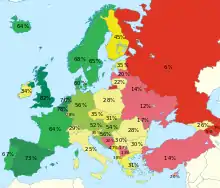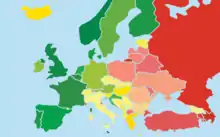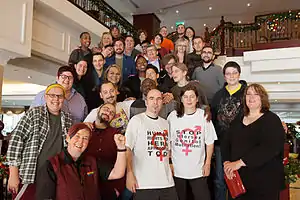ILGA-Europe
ILGA-Europe is the European region of the International Lesbian, Gay, Bisexual, Trans and Intersex Association. It is an advocacy group promoting the interests of lesbian, gay, bisexual, trans and intersex (LGBTI) people, at the European level. Its membership comprises more than 500 organisations from throughout Europe and Central Asia. The Association enjoys consultative status at Economic and Social Council of the United Nations (ECOSOC)[2] and participatory status at the Council of Europe.[3]
 | |
| Formation | 1996 |
|---|---|
| Purpose | lesbian, gay, bisexual, trans and intersex (LGBTI) rights |
| Headquarters | Brussels, Belgium |
Region served | 47 countries in the Council of Europe; Belarus, Kosovo & Central Asia |
Membership | 500+ member organisations[1] |
Executive Director | Evelyne Paradis |
Main organ | ILGA |
Staff | 24 |
| Website | www.ilga-europe.org |
History
ILGA-Europe was founded in 1996, when its parent organisation, the International Lesbian, Gay, Bisexual, Trans and Intersex Association, established separate regions.[1] It took over responsibility for supporting the development of the LGBT movement in Europe including Transgender Europe, Inter-LGBT, and for relationships with the European Union, Council of Europe and the Organisation for Security and Co-operation in Europe.[1]
Initially ILGA-Europe worked entirely on the basis of volunteer resources. However, in 2001, its potential contribution to the European Union's anti-discrimination policies (established under Article 13 of the Treaty of Amsterdam) was recognised through the provision of core funding, currently through the PROGRESS Programme.[4] This enabled ILGA-Europe to set up an office in Brussels, to recruit permanent staff, and to conduct an extensive programme of work in relation to sexual orientation discrimination within the EU Member States and the accession countries.[4] Financial support from the Sigrid Rausing Trust, the Open Society Institute, Freedom House, the US State Department and the Ministry of Education, Culture and Science of the Netherlands allows ILGA-Europe to extend its work in areas not covered by EU funding, including Eastern Europe and Central Asia, and on transgender issues.[4]
ILGA-Europe has hosted its annual conference at the end of October, since 2000, where member organisations elect the Executive Board and decide on the next year's working priorities.[5]
- 2000 – Bucharest, Romania, theme Accepting Diversity
- 2001 – Rotterdam, Netherlands, theme Creating Partnership
- 2002 – Lisbon, Portugal, theme Recognising Diversity, Promoting Equality
- 2003 – Glasgow, United Kingdom, theme Policy into Practice – making LGBT equality happen
- 2004 – Budapest, Hungary, theme Coming out to the EU
- 2005 – Paris, France
- 2006 – Sofia, Bulgaria, theme We are Family – Our families in Europe and the European family
- 2007 – Vilnius, Lithuania, theme LGBT Rights are Human Rights – Respect, Recognition and Responsibilities
- 2008 – Vienna, Austria, theme Think globally, act locally
- 2009 – Malta, theme Overcoming Religious & Cultural Barriers to LGBT Equality
- 2010 – The Hague, Netherlands, theme Expressing our differences, challenging our prejudices, developing our alliances
- 2011 – Turin, Italy, theme Human Rights and "Traditional Values": clash or dialogue?
- 2012 – Dublin, Ireland, theme Advancing LGBTI equality in challenging economic times
- 2013 – Zagreb, Croatia, theme Family matters! Reaching out to hearts and minds
- 2014 – Rīga, Latvia, theme MOVEment: Leading Sustainable Change
- 2015 – Athens, Greece, theme Many voices, One movement – Together, mobilised for a just society
- 2016 – Nicosia, Cyprus, theme Power to the People - Celebrating 20 years of the strength within
- 2017 – Warsaw, Poland, theme Communities mobilising, Movements rising
- 2018 – Brussels, Belgium, theme From Words into Action
- 2019 – Prague, Czech Republic
Current work


ILGA-Europe works to promote equality and non-discrimination for LGBTI people in asylum, education, employment, family law, freedom of assembly, hate crime, hate speech and health; and works worldwide to protect human rights defenders, trans people and intersex people.[6] The Association provides funding and training for its 500 member organisations, "to maximise efficiency and the use of resources by LGBTI organisations in working towards achievement of their goals; to maximise the impact of advocacy work at the European level; to ensure sustainability of the LGBTI movement in Europe."[7]
ILGA-Europe works with EU Institutions, the Council of Europe and the Organization for Security and Co-operation in Europe to promote equality by lobbying and advocacy, including supporting the adoption of the proposed EU Anti-Discrimination Directive, that would ban discrimination on the grounds of age, disability, religion or belief and sexual orientation in all areas of EU competence.[8] It also uses strategic litigation at the European Court of Human Rights and the European Court of Justice to end discrimination, by identifying gaps in protections, encouraging organisations and individuals to develop court cases, and support such cases with legal resources and amicus curiae briefs.[9]
For the 2014 European Parliament election, ILGA-Europe promoted its Come Out 2014 European Election Pledge to candidate MEPs, which focused on priority LGBTI issues for the 2014–2019 Parliament: an EU roadmap on LGBTI equality; EU human rights enforcement; completing the EU Anti-Discrimination directive; combating homophobic and transphobic violence; an inclusive definition of 'family'; trans rights and depatholigisation; action against school bullying; health discrimination and inequalities; LGBTI asylum seekers; and making the EU champion LGBTI rights worldwide.[10] 187 elected MEPs (25 percent) signed the pledge, including 83 members of the PES, 14 ALDE members and 14 from the EPP.[11]
Today ILGA-Europe has more than 20 staff who work in four areas: Advocacy, Communications, Finance and Administration, and Programmes. All are based at the organisation's office in the European Quarter in Brussels.
Rainbow Europe
Each May, ILGA-Europe releases its Rainbow Europe review, to mark the International Day Against Homophobia and Transphobia. It reviews the human rights situation and assesses what life is like for LGBTI people in every European country, covering discrimination, family recognition, hate speech/crimes, gender recognition, freedom of assembly, association and express, and asylum laws. In 2016, Malta came top of the rankings; it was rated to have 88% progress toward respect of human rights and full equality, just ahead of Belgium and the United Kingdom. Azerbaijan was ranked as the worst for LGBTI equality, scoring just 5%, closely followed by Russia, Armenia and Turkey. The biggest increase since the 2015 review, was that of Greece by 19 points (picking 58%).[12] The 2016 Rainbow Europe reviews are given in the table below.[13]
| Country | Laws & policies against discrimination | Family recognition | Protection against hate speech/crime | Legal gender recognition | Respect of freedom of assembly, association & expression | Asylum | Overall score | Change since 2015 |
|---|---|---|---|---|---|---|---|---|
| 40 % | 0 % | 72 % | 0 % | 100 % | 0 % | 34 % | −8% | |
| 14 % | 63 % | 18 % | 0 % | 100 % | 0 % | 32 % | +1% | |
| 0 % | 7 % | 0 % | 0 % | 65 % | 0 % | 7 % | −2% | |
| 57 % | 86 % | 36 % | 66 % | 100 % | 40 % | 64 % | +12% | |
| 0 % | 4 % | 0 % | 7 % | 35 % | 0 % | 5 % | 0% | |
| 0 % | 7 % | 0 % | 57 % | 35 % | 0 % | 13 % | −1% | |
| 90 % | 100 % | 72 % | 33 % | 100 % | 100 % | 82 % | −1% | |
| 80 % | 11 % | 36 % | 0 % | 65 % | 0 % | 39 % | +10% | |
| 50 % | 7 % | 0 % | 10 % | 100 % | 0 % | 24 % | −3% | |
| 80 % | 48 % | 90 % | 37 % | 100 % | 40 % | 67 % | −4% | |
| 11 % | 48 % | 36 % | 0 % | 100 % | 20 % | 32 % | +14% | |
| 50 % | 28 % | 0 % | 24 % | 100 % | 0 % | 32 % | −3% | |
| 45 % | 100 % | 54 % | 79 % | 100 % | 40 % | 71 % | +3% | |
| 31 % | 31 % | 18 % | 56 % | 100 % | 0 % | 36 % | +2% | |
| 48 % | 58 % | 42 % | 39 % | 98 % | 35 % | 53 % | N/A | |
| 75 % | 89 % | 72 % | 43 % | 100 % | 60 % | 75 % | +13% | |
| 70 % | 78 % | 90 % | 16 % | 100 % | 0 % | 67 % | +2% | |
| 50 % | 7 % | 36 % | 23 % | 65 % | 0 % | 30 % | −6% | |
| 69 % | 56 % | 5 % | 66 % | 100 % | 80 % | 55 % | −1% | |
| 54 % | 48 % | 91 % | 24 % | 100 % | 40 % | 58 % | +19% | |
| 50 % | 41 % | 72 % | 30 % | 100 % | 20 % | 51 % | +1% | |
| 13 % | 89 % | 72 % | 49 % | 100 % | 40 % | 59 % | −4% | |
| 25 % | 89 % | 18 % | 79 % | 100 % | 20 % | 55 % | +15% | |
| 11 % | 37 % | 0 % | 40 % | 100 % | 40 % | 29 % | +7% | |
| 75 % | 7 % | 18 % | 0 % | 65 % | 40 % | 32 % | +14% | |
| 11 % | 7 % | 0 % | 24 % | 100 % | 40 % | 18 % | 0% | |
| 0 % | 41 % | 0 % | 0 % | 65 % | 40 % | 18 % | −1% | |
| 20 % | 4 % | 36 % | 10 % | 30 % | 20 % | 18 % | −1% | |
| 31 % | 89 % | 36 % | 16 % | 100 % | 20 % | 50 % | +7% | |
| 26 % | 7 % | 0 % | 7 % | 100 % | 0 % | 18 % | +5% | |
| 87 % | 78 % | 100 % | 100 % | 100 % | 40 % | 88 % | +11% | |
| 11 % | 7 % | 0 % | 40 % | 30 % | 20 % | 11 % | 0% | |
| 0 % | 7 % | 18 % | 0 % | 65 % | 0 % | 11 % | 0% | |
| 80 % | 7 % | 72 % | 24 % | 65 % | 0 % | 45 % | −1% | |
| 40 % | 100 % | 36 % | 80 % | 100 % | 80 % | 66 % | −3% | |
| 70 % | 96 % | 36 % | 79 % | 100 % | 100 % | 76 % | +7% | |
| 11 % | 4 % | 0 % | 37 % | 100 % | 20 % | 18 % | −8% | |
| 57 % | 100 % | 72 % | 66 % | 100 % | 40 % | 76 % | +9% | |
| 25 % | 4 % | 18 % | 24 % | 100 % | 20 % | 23 % | −3% | |
| 0 % | 15 % | 0 % | 17 % | 0 % | 0 % | 7 % | −1% | |
| 0 % | 7 % | 36 % | 0 % | 65 % | 0 % | 14 % | 0% | |
| 60 % | 4 % | 54 % | 0 % | 65 % | 0 % | 32 % | +3% | |
| 50 % | 4 % | 18 % | 14 % | 100 % | 40 % | 29 % | 0% | |
| 59 % | 56 % | 18 % | 7 % | 100 % | 20 % | 43 % | +11% | |
| 35 % | 100 % | 74 % | 59 % | 100 % | 60 % | 70 % | +1% | |
| 65 % | 89 % | 36 % | 56 % | 100 % | 20 % | 65 % | −7% | |
| 25 % | 44 % | 0 % | 26 % | 100 % | 60 % | 33 % | +5% | |
| 0 % | 4 % | 0 % | 17 % | 65 % | 0 % | 9 % | −3% | |
| 10 % | 7 % | 0 % | 24 % | 65 % | 0 % | 13 % | +3% | |
| 83 % | 97 % | 70 % | 64 % | 100 % | 60 % | 81 % | −5% |
International Intersex Forum

To include intersex people in its remit, ILGA-Europe and ILGA have jointly sponsored the only international gathering of intersex activists and organisations. The International Intersex Forum has taken place in Europe annually since 2011.[14][15][16][17]
The third forum was held in Malta in 2013 with 34 people representing 30 organisations from all continents. The closing statement affirmed the existence of intersex people, reaffirmed "the principles of the First and Second International Intersex Fora and extend the demands aiming to end discrimination against intersex people and to ensure the right of bodily integrity, physical autonomy and self-determination". For the first time, participants made a statement on birth registrations, in addition to other human rights issues.[17][18][19]
References
- "What is ILGA-Europe?". ILGA-Europe. Archived from the original on 2014-06-25. Retrieved 2014-05-29.
- "NGO Branch, United Nations Department of Economic and Social Affairs". United Nations. Retrieved 2013-11-02.
- Base de donées ONG : European Region of the International Lesbian, Gay, Bisexual, Trans and Intersex Association (ILGA-Europe) Archived 2013-11-06 at the Wayback Machine Council of Europe, accessed 2 November 2013.
- "ILGA-Europe's funding". ILGA-Europe. Archived from the original on 2014-06-25. Retrieved 2014-05-29.
- "Annual Conference". ILGA-Europe. Archived from the original on 2014-06-25. Retrieved 2014-05-29.
- "Issues we work on". ILGA-Europe. 2014. Archived from the original on 2014-06-25. Retrieved 2014-05-29.
- "Developing the LGBTI movement". ILGA-Europe. 2014. Archived from the original on 2014-06-25. Retrieved 2014-05-29.
- "Working with the European Institutions". ILGA-Europe. 2014. Archived from the original on 2014-05-06. Retrieved 2014-05-29.
- "Strategic litigation in the European Courts". ILGA-Europe. 2014. Archived from the original on 2014-06-25. Retrieved 2014-05-29.
- "Come Out 2014 European Election Pledge". ILGA-Europe. 2014. Archived from the original on 2014-05-29. Retrieved 2014-05-29.
- "A quarter of elected European Parliament committed to LGBTI equality". ILGA-Europe. 2014. Archived from the original on 2014-05-29. Retrieved 2014-05-29.
- "Changing laws and changing lives are not always the same thing". 2016. Archived from the original on 2018-10-27. Retrieved 2017-04-07.
- "Country rankings". 2016.
- First ever international intersex forum Archived 2013-12-26 at the Wayback Machine, ILGA-Europe (Creative Commons statement), 6 September 2011
- First ever international intersex forum Archived 2014-05-17 at the Wayback Machine, ILGA, 7 September 2011
- Public statement by the third international intersex forum, Organisation Intersex International Australia, 2 December 2013
- Global intersex community affirms shared goals, Star Observer, December 4, 2013
- 3rd International Intersex Forum concluded Archived 2013-12-04 at the Wayback Machine, ILGA-Europe (Creative Commons statement), 2 December 2013
- (in Dutch) Derde Internationale Intersekse Forum, Nederlandse Netwerk Intersekse/DSD (NNID), 3 December 2013
Further reading
- Ayoub, Phillip M.; Paternotte, David (2016). Translated by Ethan Rundell. "The International Lesbian and Gay Association (ILGA) and the Expansion of LGBT Activismin a Unified Europe". Critique internationale. 70 (1): 55–70.
- Kristoffersson, Mattias; van Roozendaal, Björn; Poghosyan, Lilit (2016). "European Integration and LGBTI Activism: Partners in Realising Change?". The EU Enlargement and Gay Politics: The Impact of Eastern Enlargement on Rights, Activism and Prejudice. Palgrave Macmillan UK. pp. 45–67. ISBN 978-1-137-48093-4.
- Paternotte, David (2016). "The NGOization of LGBT activism: ILGA-Europe and the Treaty of Amsterdam". Social Movement Studies. 15 (4): 388–402. doi:10.1080/14742837.2015.1077111.
- Stychin, Carl F. (2001). "Sexual Citizenship in the European Union". Citizenship Studies. 5 (3): 285–301. doi:10.1080/13621020120085252.
External links
| Wikimedia Commons has media related to ILGA-Europe. |